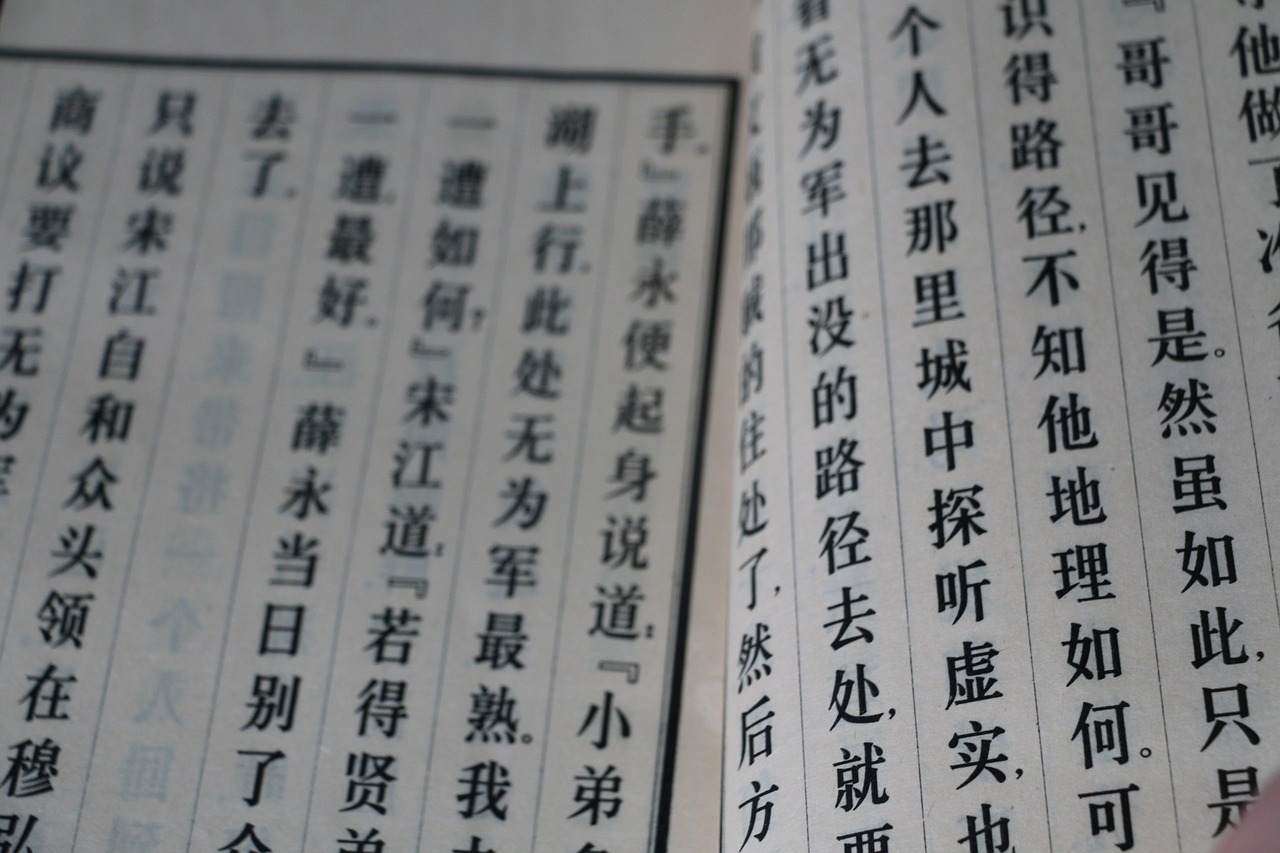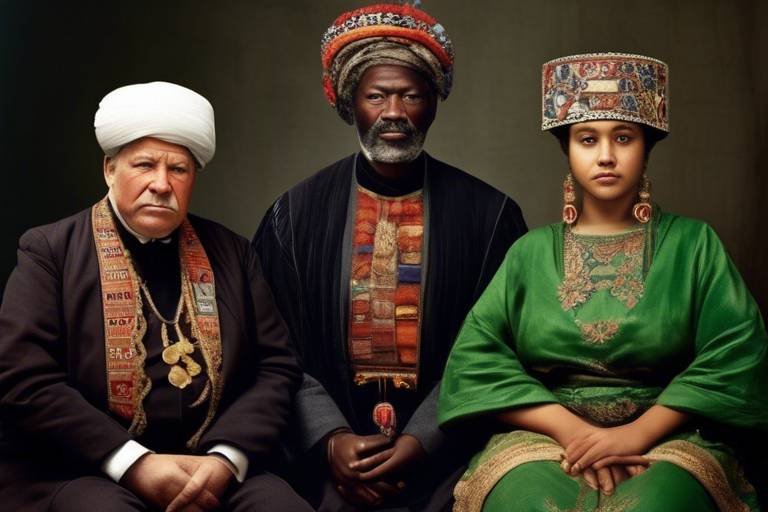The Influence of Ancient Chinese Philosophy on Modern Society
Ancient Chinese philosophy has left an indelible mark on modern society, shaping our values, beliefs, and way of life in profound ways. From the teachings of Confucianism to the principles of Taoism, Buddhism, Legalism, Mohism, and more, the wisdom of ancient Chinese thinkers continues to resonate in the contemporary world. Let's delve into how these philosophies have influenced various aspects of modern society and continue to impact our lives today.

Confucianism
Confucianism, an ancient Chinese philosophy attributed to the teachings of Confucius, has left a lasting impact on social structures and values in contemporary society. The core principles of Confucianism emphasize filial piety, respect for elders, and the importance of social harmony. These values have influenced various aspects of modern life, from family dynamics to business practices.
One of the key tenets of Confucianism is the concept of ren, which can be translated as benevolence or humaneness. This idea underscores the importance of cultivating virtuous relationships with others and behaving in a morally upright manner. In today's world, the value of empathy and compassion promoted by Confucianism continues to be relevant in fostering strong interpersonal connections and building cohesive communities.
Furthermore, the emphasis on education and self-improvement in Confucian teachings has had a profound impact on shaping educational systems globally. The pursuit of knowledge, ethical conduct, and the cultivation of personal character are all values that can be traced back to Confucian ideals. In modern society, the emphasis on lifelong learning and personal development can be seen as a reflection of these foundational principles.
Moreover, the influence of Confucianism extends beyond individual behavior to encompass broader societal structures. The emphasis on hierarchical relationships and social order has influenced governance systems and organizational structures in various cultures. The idea of a harmonious society built on mutual respect and social responsibility can be seen as a legacy of Confucian thought.
In essence, Confucianism offers a holistic framework for ethical living and social interaction that continues to resonate in contemporary society. By promoting values such as integrity, loyalty, and community-mindedness, Confucianism provides a timeless guide for navigating the complexities of the modern world while striving for personal and collective flourishing.

Taoism
Taoism, also known as Daoism, is a philosophical and spiritual tradition that originated in ancient China. Central to Taoist beliefs is the concept of the Tao, which can be translated as "the Way" or "the Path." The Tao represents the natural order of the universe, emphasizing harmony, balance, and the interconnectedness of all things. Unlike Confucianism, which focuses on social ethics and moral conduct, Taoism places greater emphasis on individual spirituality and the cultivation of inner peace.
One of the key principles of Taoism is the idea of Wu Wei, often translated as "non-action" or "effortless action." This concept encourages individuals to align themselves with the natural flow of the universe, letting go of excessive striving and allowing things to unfold organically. By practicing Wu Wei, Taoists believe that one can achieve a state of harmony with the Tao and experience a profound sense of tranquility and contentment.
In modern society, Taoist philosophies continue to influence various aspects of life, particularly attitudes towards nature and spirituality. The emphasis on living in harmony with the natural world resonates with contemporary environmental movements, promoting sustainable practices and a deep respect for the Earth. Additionally, the focus on inner reflection and mindfulness in Taoism has found relevance in the realm of mental health and well-being, with practices such as meditation and qigong gaining popularity for their stress-relieving benefits.
Furthermore, the concept of Yin and Yang, symbolizing the complementary forces of darkness and light, feminine and masculine, is deeply rooted in Taoist thought. This principle of balance and harmony is reflected in various aspects of modern life, from holistic approaches to health and wellness to the understanding of interconnectedness in global systems.
Overall, Taoism's enduring influence on modern society lies in its profound teachings on interconnectedness, balance, and the pursuit of inner peace amidst the complexities of the world.

Buddhism
Buddhism, originating from the teachings of Siddhartha Gautama, commonly known as the Buddha, has spread its influence across the globe. The core principles of Buddhism, such as mindfulness, compassion, and non-attachment, have significantly impacted modern society. In today's fast-paced world, where stress and anxiety are prevalent, the practice of mindfulness derived from Buddhist traditions has gained popularity as a means to achieve mental well-being and inner peace.
Moreover, the emphasis on compassion and empathy in Buddhism has led to the integration of these values into various social welfare programs and initiatives. The concept of interconnectedness, central to Buddhist philosophy, has inspired movements promoting environmental conservation and sustainable living practices. By recognizing the interdependence of all beings and the environment, Buddhism offers a holistic approach to addressing contemporary global challenges.
Furthermore, the teachings of Buddhism on impermanence and the nature of suffering have influenced modern perspectives on resilience and acceptance. By acknowledging the transient nature of life and the inevitability of change, individuals are encouraged to cultivate a mindset of adaptability and equanimity in the face of adversity.
Through practices such as meditation and mindfulness, Buddhism has provided tools for individuals to cultivate self-awareness, emotional regulation, and mental clarity. These practices have been integrated into various therapeutic approaches, such as mindfulness-based stress reduction (MBSR) and mindfulness-based cognitive therapy (MBCT), demonstrating the practical applications of Buddhist principles in promoting psychological well-being.
Overall, the profound teachings of Buddhism continue to resonate in modern society, offering timeless wisdom and practical guidance for navigating the complexities of life with grace and wisdom.

Legalism
Legalism, an ancient Chinese philosophy that emphasizes strict adherence to laws and the authority of the state, continues to influence modern governance and legal systems. The core principles of Legalism, such as the importance of clear laws, strong leadership, and centralized control, can be seen in various political structures around the world today. The idea of using strict laws and harsh punishments to maintain social order and stability resonates with the concept of law enforcement in contemporary society.
Legalist ideas have shaped the development of legal systems, leading to the establishment of clear rules and regulations that govern behavior and ensure accountability. The focus on meritocracy and efficiency in governance, as advocated by Legalist thinkers, has influenced the way governments operate and make decisions in the present day.
While Legalism is often criticized for its authoritarian tendencies and lack of emphasis on individual freedoms, some argue that certain aspects of Legalist philosophy, such as the promotion of order and discipline, are essential for maintaining social cohesion and preventing chaos. The balance between the rule of law and the protection of individual rights continues to be a topic of debate in modern legal and political discourse.
Furthermore, the legacy of Legalism can be observed in the emphasis on strong leadership and centralized authority in various institutions, including corporations and organizations. The idea of hierarchy and obedience to authority, central tenets of Legalist thought, can still be seen in hierarchical structures within modern workplaces and management practices.

Mohism
Mohism, an ancient Chinese philosophy founded by Mozi, emphasizes universal love, impartiality, and frugality. The core tenets of Mohism revolve around the promotion of social harmony through the practice of universal love and mutual benefit. Unlike Confucianism, which prioritizes hierarchical relationships, Mohism advocates for the equal treatment of all individuals regardless of their social status. This philosophy encourages altruism and selflessness, aiming to create a society based on mutual care and support.
One of the fundamental principles of Mohism is the concept of "jian ai," which translates to "inclusive care" or "impartial love." This principle underscores the importance of treating all individuals with compassion and empathy, regardless of personal relationships or affiliations. Mohists believe that by practicing universal love and impartiality, individuals can contribute to the greater good of society and foster a sense of unity among people.
In addition to promoting social harmony through universal love, Mohism also emphasizes the value of frugality and simplicity. Mohists advocate for the avoidance of extravagance and wastefulness, encouraging individuals to lead modest and humble lives. By practicing frugality, adherents of Mohism aim to cultivate a sense of contentment and gratitude, appreciating the simple pleasures of life without being consumed by material desires.
Furthermore, Mohism places a strong emphasis on the importance of practicality and utility in decision-making. Mohists believe in the application of reason and logic to solve practical problems and improve societal conditions. This pragmatic approach to ethics and governance distinguishes Mohism from other philosophical schools in ancient China, highlighting its focus on tangible results and societal well-being.

Yin and Yang
The concept of Yin and Yang is a fundamental principle in ancient Chinese philosophy, representing the duality and interconnectedness of opposite forces in the universe. Yin symbolizes darkness, femininity, passivity, and cold, while Yang represents light, masculinity, activity, and heat. Together, they form a harmonious balance that is essential for the functioning of the cosmos. This philosophy emphasizes the dynamic interplay between contrasting elements, illustrating how seemingly opposing forces are actually complementary and interdependent.
In modern society, the concept of Yin and Yang continues to hold significant relevance, serving as a metaphor for various aspects of life. It reminds us that harmony can be found in diversity, and that balance is key to overall well-being. Just as day transitions into night and back again, life is a cycle of constant change where one force gives rise to the other in a perpetual dance of creation and destruction.
Moreover, the Yin and Yang philosophy has influenced various fields, including traditional Chinese medicine, martial arts, feng shui, and even psychology. In healthcare, practitioners use the concept to diagnose and treat illnesses by restoring the balance of Yin and Yang energies within the body. In martial arts, fighters seek to harmonize their movements with the opposing forces of Yin and Yang to achieve fluidity and strength.
When applied to personal development, the Yin and Yang principle encourages individuals to embrace their dual nature and recognize the interconnectedness of their strengths and weaknesses. By acknowledging and integrating these contrasting aspects, one can cultivate a sense of wholeness and authenticity.
Overall, the philosophy of Yin and Yang offers a profound perspective on the nature of existence and the interconnectedness of all things. It invites us to contemplate the harmonious interplay of opposites in our lives and strive for balance and unity amidst the ever-changing world around us.

Five Elements Theory
The Five Elements Theory, also known as Wu Xing, is a fundamental concept in traditional Chinese philosophy and medicine. This theory posits that the world is composed of five elements - wood, fire, earth, metal, and water - that interact with each other in dynamic ways to maintain balance and harmony. Each element is associated with specific qualities, seasons, colors, organs in the body, and emotions.
Wood represents growth, flexibility, and creativity; fire symbolizes passion, transformation, and energy; earth signifies stability, nourishment, and balance; metal embodies strength, clarity, and precision; and water represents adaptability, intuition, and flow. These elements are not just physical substances but are seen as metaphors for understanding the natural world and human experiences.
In traditional Chinese medicine, the Five Elements Theory is used to diagnose and treat illnesses by identifying imbalances in the body's energy flow. Practitioners believe that each element corresponds to different organ systems and that maintaining harmony between them is essential for good health. For example, an excess of fire element may manifest as inflammation or fever, while a deficiency of water element could lead to issues with the urinary system.
Moreover, the Five Elements Theory extends beyond healthcare and is applied in various aspects of Chinese culture, such as feng shui, martial arts, and astrology. By recognizing the interconnectedness of these elements, individuals can align themselves with the natural rhythms of the universe and achieve a state of equilibrium in their lives.

I Ching
The , also known as the Book of Changes, holds a significant place in ancient Chinese philosophy and continues to captivate individuals seeking guidance and insight in the modern era. This timeless text serves as a profound source of wisdom, offering a glimpse into the cyclical nature of life and the interconnectedness of all things. Through a series of hexagrams and interpretations, the I Ching provides a framework for understanding the complexities of existence and navigating the uncertainties of the future.
One of the key aspects that make the I Ching enduringly popular is its versatility as a tool for divination and decision-making. By consulting the I Ching, individuals can gain clarity on pressing issues, uncover hidden truths, and contemplate the underlying forces at play in their lives. The symbolic language of the hexagrams allows for a nuanced exploration of various situations, offering nuanced perspectives and guidance that resonate on a deep level.
Moreover, the I Ching serves as a mirror reflecting the interconnectedness of the natural world and human experience. Its teachings emphasize the importance of harmony, balance, and adaptability, urging individuals to align themselves with the rhythms of nature and embrace change as an inherent part of life's journey. The profound insights gleaned from the I Ching transcend cultural boundaries and resonate with seekers of wisdom across the globe.
As we navigate the complexities of the digital age, the enduring relevance of the I Ching persists, offering a timeless beacon of wisdom in a rapidly changing world. Its teachings continue to inspire individuals to seek deeper understanding, cultivate inner harmony, and make informed decisions that resonate with their true purpose and values. The I Ching stands as a testament to the enduring power of ancient wisdom in guiding us towards a more meaningful and fulfilling existence.

Neo-Confucianism
Neo-Confucianism emerged as a philosophical movement in China during the Song dynasty, blending Confucian principles with metaphysical ideas from Taoism and Buddhism. This fusion of beliefs aimed to provide a comprehensive framework for understanding the universe and guiding human behavior. In modern times, Neo-Confucianism continues to influence various aspects of society, particularly in East Asia where its teachings have permeated education, ethics, and cultural norms.
One of the key tenets of Neo-Confucianism is the emphasis on self-cultivation and moral rectitude. Followers of this philosophy believe in the importance of personal development through introspection and ethical conduct. By cultivating virtues such as benevolence, righteousness, and propriety, individuals strive to attain harmony within themselves and with the world around them.
Neo-Confucian thought also places a strong emphasis on the role of education in shaping individuals and society as a whole. Scholars and educators draw upon Neo-Confucian principles to promote lifelong learning, moral education, and the pursuit of wisdom. This educational philosophy underscores the interconnectedness of knowledge, virtue, and social responsibility.
Furthermore, Neo-Confucianism has had a significant impact on the ethical foundations of East Asian societies, guiding interpersonal relationships, social hierarchies, and communal values. The emphasis on filial piety, loyalty, and respect for authority reflects the enduring influence of Neo-Confucian ethics on familial and societal structures.
In the realm of cultural identity, Neo-Confucianism has played a pivotal role in shaping the collective consciousness of East Asian communities. Its teachings on harmony, balance, and social order have contributed to the development of a shared cultural heritage that transcends national boundaries.
Overall, Neo-Confucianism continues to be a vibrant and evolving philosophical tradition that resonates with contemporary concerns about ethics, education, and social cohesion. Its enduring legacy underscores the enduring relevance of ancient Chinese philosophy in navigating the complexities of the modern world.
Frequently Asked Questions
- What is the significance of Confucianism in modern society?
Confucianism continues to influence social structures and values by emphasizing respect for elders, family harmony, and ethical behavior. Its principles promote order and stability in communities, shaping interpersonal relationships and guiding moral conduct.
- How has Taoism impacted modern attitudes towards nature and spirituality?
Taoist philosophies encourage harmony with nature, leading to a greater appreciation for the environment and a focus on inner peace and spiritual connection. Its teachings inspire individuals to live in balance with the natural world and seek tranquility in a fast-paced society.
- What role does Buddhism play in promoting mindfulness and well-being today?
Buddhist teachings on mindfulness and compassion have gained popularity in modern society, offering tools for managing stress, enhancing mental health, and fostering emotional resilience. Practices like meditation and mindfulness have been widely adopted for their positive impact on well-being.
- How do Legalist ideas influence governance and law enforcement in contemporary political systems?
Legalist principles, with their focus on strict laws and centralized authority, have influenced approaches to governance and law enforcement in some modern political systems. The emphasis on order and control reflects in policies and practices aimed at maintaining social stability and efficiency.
- What are the ethical principles of Mohism and how are they relevant in promoting social harmony today?
Mohist ethics center on universal love, impartiality, and frugality, advocating for altruistic behavior and social harmony. These principles resonate in initiatives promoting equality, social welfare, and cooperation to address contemporary societal challenges.
- How does the concept of Yin and Yang contribute to balance and harmony in modern life?
The Yin and Yang philosophy underscores the interplay of opposing forces to achieve balance and harmony. Its application in daily life involves recognizing and integrating contrasts to foster equilibrium, resilience, and holistic well-being in personal and professional spheres.
- In what ways is the Five Elements Theory integrated into modern healthcare practices?
The Five Elements Theory, a cornerstone of traditional Chinese medicine, informs holistic approaches to health and wellness. Its application in modern healthcare involves understanding the interconnectedness of bodily functions, emotions, and the environment to promote overall well-being and prevent illness.
- Why does the I Ching remain popular for divination and decision-making in the digital age?
The enduring popularity of the I Ching stems from its timeless wisdom and adaptability to modern contexts. As a tool for guidance and reflection, it offers insights into complex situations, aids in decision-making, and provides a source of spiritual guidance in an increasingly digital and uncertain world.
- How has Neo-Confucianism revived and influenced education, ethics, and cultural identity in the 21st century?
The revival of Neo-Confucian thought has sparked interest in its teachings on ethics, self-cultivation, and social responsibility. Its influence on education emphasizes moral development and critical thinking, shaping ethical frameworks and cultural identity in contemporary society.



















